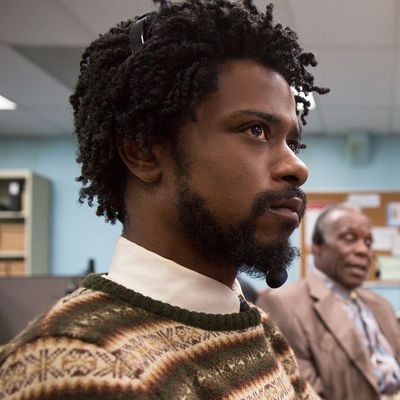
“You don’t talk white enough,” veteran telemarketer Langston (Danny Glover) advises his young deskmate in an early Sorry to Bother You scene. Cassius Green (Lakeith Stanfield) is new to telemarketing company Regal View, and having a hard time getting the hang of the company’s sales pitch. He’s selling encyclopedias no one really wants, and can’t make it through one call without being hung up on. Langston gives him a word of advice: “I’m not talking Will Smith–white,” he says. “I’m talking about the real deal.”
Langston clicks on his headset and begins talking to a potential client — except instead of Danny Glover’s deep croak, it’s an upbeat voice, one that sounds like a gingham Vineyard Vines button-down became sentient while sitting on the deck of a lake house, sipping a beer kept chilled in a Georgetown koozie. David Cross, who plays Stanfield’s white voice, describes his vocals thusly in a featurette for the film: “If you could put a Brooks Brothers jacket and a pair of dockers on a voice, that’s what we’ve got.”
In Sorry to Bother You’s universe, using a white voice doesn’t just mean “talking proper,” or with a certain Southern or coastal accent, explains director Boots Riley, who came up with the movie after his own telemarketing stint, and included the dubbed white voice as he was finishing the script in 2012. “It’s what white people think they’re supposed to sound like. As it’s laid out in the movie, their performance of whiteness is their version of the opposite of, or response to, the racist tropes of blackness,” he says. “There’s a performance of whiteness that has to do with people aligning with their own oppression, or aligning with their own oppressors.” White people perform whiteness and privilege, and Sorry to Bother You considers what happens when black people take on that same performance — and align with their oppressors, to succeed in a sinister capitalist system. White voice is, effectively, everything a stereotypical “black voice” isn’t.
Cassius deploys his white voice on calls, and uses its effect to secure a promotion. Suddenly he’s a Power Caller, moved upstairs to the sleek co-working-style space where he has to use his white voice all the time. Its privileges begin to bleed into other parts of his life: He uses it casually as a party trick, and he accidentally says good morning to his girlfriend in his nasally white register. In one scene, Green’s girlfriend Detroit (Tessa Thompson) uses her white voice in a performance art piece. It’s only when Cassius performs a rap for his white bosses and their friends — just the N-word on repeat, not actual rhymes — that Cassius exploits his own natural voice, using it to meet their white expectations of his black identity. Steve Lift, the CEO of private prison labor camp WorryFree, played by Armie Hammer — perhaps the world’s whitest, most moneyed voice — doesn’t have to be dubbed: Hammer is white, but his voice can also match the performance of whiteness.
Oftentimes, the white voices aren’t dubbed in precisely, to a greater effect: There’s less fun in seeing David Cross’s voice being perfectly delivered from Lakeith’s lips, or Patton Oswalt’s voice delivered flawlessly by Cassius’s Power Caller boss, Mr. ___ (Omari Hardwick). Something so morally dubious ought to have a goofy, otherworldly effect. “It’s supposed to look like an overdub and sound like an overdub to everyone around them. It’s not just a film representation of people making their voice sound white,” Riley says. “The characters know that there’s this magic thing happening. I wanted to portray that and I wanted it to seem that there was this off-putting thing happening.”
Riley first experimented with the filming white voice sequences at a Sundance Lab in 2015, long before the movie began filming in summer 2017. “[Initially] I thought it was better to have the actor just mouth the words, more exaggerated. And then I would have someone else reading the words, to fit with it. But logistics on set made it so that that wasn’t always the best way to do it,” Riley says. Instead, they developed a variety of workarounds: “Sometimes we had somebody reading lines off camera and the actors just mouthing the words; other times we had them just saying the words and then we overdubbed it later.”
In one particular scene, Detroit is doing a performance-art piece at her gallery opening, repeating a line from the ’80s cult-classic The Last Dragon. Lily James’s voice is dubbed over Thompson’s, but Thompson “was just mouthing the words and there was nobody even off-screen reading along with her,” Riley says. “Whereas the other times when people were mouthing the words there was someone off screen reading. She had a certain performance she wanted to do, and it would have taken someone else actually knowing the dialogue and looking at her and saying it [during the scene] for it to work.”
For Riley, Sorry to Bother You’s white voice isn’t just an interpretation of code switching, as it’s been sometimes described. “Code switching can be changing your voice to sound more white. Sometimes you can do that knowing that people know you’re black but to say, Hey, I’m friendly.” (That’s Will Smith–white.) Cassius isn’t trying to make people comfortable with his blackness, but trying to transcend black stereotypes and racist white tropes to more money: “In the case of the telemarketers, we see Cassius actually trying to make people think that he’s white, which is a different thing altogether. It’s him hiding the fact that he’s black, which is not what everyone does in the workplace when they’re code switching.” White voice, according to Sorry to Bother You, is beyond swapping a Friday reference for a Friends riff; the capitalist economy rewards black people who perform to their stereotypes or can mask their non-white identity fully: “The whole movie deals with performance,” Riley says. “The idea that race, and its definitions, are mostly performed.”


